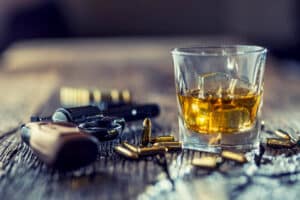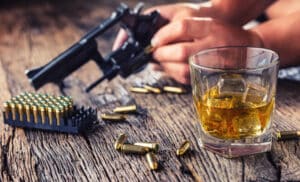Drug and Alcohol Abuse and Firearms Eligibility in NJ

Substance Dependency as a Disqualification for Firearms under NJ Law
Statutes in Jersey are pretty clear that those with a history of drug abuse or alcohol addiction face substantial hurdles when it comes to gun ownership. Specific laws govern who may legally purchase, possess, or carry firearms, and those laboring with the struggles of addiction usually get set in prohibited categories. For example, N.J.S.A. 2C:58-3 expressly lists substance abuse as a disqualification for getting a firearms purchaser identification card or permit to purchase a handgun. This displays the severity and scrutiny the state holds toward the intersectionality of substance abuse and gun ownership.
Impact of Drug and Alcohol Addiction on Gun Rights in New Jersey
The list of what is considered substance abuse is wide, from illegal drug use to chronic alcoholism or addiction. Both can have serious consequences on your gun rights. The process of obtaining firearms in New Jersey includes stringent background and mental health records checks and application questions related to drug and alcohol use. Applicants are required to answer honestly about their substance use history, as dishonesty can result in application denial or even criminal charges. An applicant’s failure to disclose a history of substance abuse may lead to legal repercussions, including permanent disqualification from owning firearms. In an Application for Firearms Purchaser Application Card or Permit to Purchase a Handgun, the applicant is asked:
- Are you an alcoholic?; and
- Are you dependent upon the use of a narcotic(s) or other controlled dangerous substance(s)?
In addition, on a Certificate of Eligibility that must be completed for the legal transfer of a firearm from the seller or giver to the recipient, the form explicitly asks the person receiving the firearm:
- Are you an alcoholic?
- Are you dependent upon the use of any narcotic or other controlled dangerous substance?
If you use controlled substances with a valid prescription from a licensed practitioner, those with a known and documented history of addiction could discover they are barred from ever owning firearms. The law will also consider how the substances impair judgment, increase impulsivity, and contribute to behavioral issues that can pose risks to the safety of the greater public.
How Substance Abuse Treatment Affects Firearm Eligibility

The dual consideration of substance abuse and mental health emphasizes the state’s priority to prevent any potential risks associated with gun ownership. For instance, those who undergo involuntary or voluntary commitment for substance abuse treatment are usually going to be banned from firearm possession in NJ. These commitments signal to the state that you might pose a potential risk to yourself or others. You should seek to expunge your mental health records before applying for a gun permit in these cases, which can be a valuable step toward restoring your gun rights.
Losing your gun rights can feel permanent, but there are circumstances under which they may be restored. Individuals who have demonstrated a sustained period of sobriety and rehab could potentially petition and see the restoration of their gun rights. The process involves applying for a mental health expungement, which can remove barriers that previously disqualified the individual from firearm ownership. However, seeking restoration of such serious rights is not going to be an easy or simple mission. The process involves a lot of steps and is part of a more detailed legal procedure while also meeting many requirements. Individuals must be able to demonstrate they no longer pose a risk to the public’s well-being and that their substance issues are definitively in the past.
Strong legal representation is going to make a big difference in this endeavor, as it will help you present a strong and compelling case for restoration. Our legal team can assist you with this challenge and put you in the best possible position for success.
When Addiction Leads to Other Legal Issues Preventing Weapons Possession
Committing Drug-Related Crimes
It is not uncommon for addiction to make otherwise law-abiding citizens make choices that they otherwise would not. When this occurs, the consequences can be dire for their personal life, lead to punishment in the criminal justice system, and prevent them from owning or possessing guns in the future. Drug-related crimes, even those that do not directly involve firearms, can induce gun ownership blockades.
Substance-Fueled Domestic Violence Incidents
Domestic violence restraining orders, often stemming from chaotic or violent situations aggravated by substance misuse, frequently lead to weapons forfeiture and permanent firearms restrictions as well. Once firearms are confiscated, regaining possession becomes an uphill battle, often requiring considerable legal intervention methods and strategy.
Failure to Adhere to Weapons Restrictions
Weapons forfeiture and loss of gun rights is a sobering consequence for those who violate New Jersey law, particularly as it relates to felony crimes. In fact, Certain Persons Not to Have Weapons is a specific law that prohibits people convicted of certain crimes from ever possessing guns or other weapons. Further, persons found in breach of these laws could see additional legal scrutiny, making it even more difficult to overcome the harsh punishments that befall them. Being charged with a certain persons offense carries substantial prison time for those convicted. These major consequences echo the need for strict adherence to state firearm laws and guidelines.
If you or a family member has violated the state’s gun laws, penalties can be really strict. For those who are prohibited from owning or possessing firearms, those penalties get even heftier. When charged with a criminal offense that comes with substantial financial penalties, incarceration, and, of course, a criminal record, you need the strongest defense possible. Our weapons defense lawyers are prepared with decades of experience to challenge the case against you. We do this on behalf of clients in courts across New Jersey on a daily basis and our attorneys will do everything in our power to secure the best outcome in your case.
Contact our NJ Attorneys to Overcome the Hurdles of Substance-Related Concerns Impacting Your Firearms Rights or Your Freedom
If you are facing possible firearms restrictions related to drugs or alcohol, seeking to regain your gun rights, or have been charged with a weapons crime in New Jersey, the support of a trusted and skilled attorney is going to really help lift your case and your prospects. Contact The Tormey Law Firm today at (201)-614-2474 for a confidential and free consultation with an experienced New Jersey weapons lawyer who will stop at nothing to protect and fight for you.
